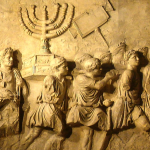by Fr. Patrick Henry Reardon
 History was not kind to the Jewish people during the century following the trial of Jesus. Just before that trial, Israel’s last prophet wept over Jerusalem and foretold the destruction of its Temple, and within a generation of that prophecy the Holy Land was engulfed in a series of Jewish revolts against Rome, a running conflict culminating in the fall of Jerusalem to the Roman army.
History was not kind to the Jewish people during the century following the trial of Jesus. Just before that trial, Israel’s last prophet wept over Jerusalem and foretold the destruction of its Temple, and within a generation of that prophecy the Holy Land was engulfed in a series of Jewish revolts against Rome, a running conflict culminating in the fall of Jerusalem to the Roman army.
The fall itself, in July of A.D. 70, was preceded by a siege of three and a half years, during which many thousands of Jews perished of hunger, disease, and incessant infighting among the city’s defenders. Although Titus, the commander of the Roman forces, was disposed to preserve the Temple after the city’s fall, it was gutted by a fire that spread from some neighboring buildings. According to Josephus, the Jewish historian present during the entire tragedy, 97,000 Jews were captured and enslaved.
Even then, however, the unrest did not end; it moved south. Just west of the Dead Sea stands a very high plateau known in antiquity as “the fortress,” in Hebrew metzadah, from which name it has long been called “Masada.” On this nearly invincible site a remnant of Jews held out against the Romans for three more years. In the end most of them finally preferred suicide to capture.
Nor did the fall of Masada finish Jewish nationalism and resistance to Rome. Early in the second century there were Jewish uprisings in Cyrene, Egypt, Cyprus, and the Fertile Crescent. Because those local revolts were put down by a Roman general called Lusius Quietus, they are jointly referred to as the Kitos War.
The final war between Rome and the Jews was waged during the years 132-136. The Jewish leader was Simon bar Kosiba, better known to history as “Bar Kokhba,” “son of the star.” Simon received this name from rabbis who believed his appearance in history fulfilled the prophecy in Numbers 24:17:
“A star shall emerge from Jacob, / A scepter will arise out of Israel.”
The great Akiva ben Joseph (40-137), an important contributor to the Mishnah and arguably the most venerated rabbi of the time, regarded Bar Kokhba as the Messiah. Subsequent to the failure of his revolt, however, rabbis took to calling him “Bar Kozeba,” “son of a lie.”
After Bar Kokhba a deep and darkening cloud fell over the Jews. Now deprived of their homeland, they lived wherever they could, guests wherever they went. Nor was this separation from the land, it seems, the worst form of their alienation. In the words of Yosef Hayim Yerushalmi,
“Three tremendous uprisings against Rome, all with eschatological overtones, had ended in disaster and disillusion.”
After so much historical disappointment, who could blame the Jews for abandoning their interest in history?
After centuries of interpreting the events of history, sheer disappointment forced the Jews finally to abandon the effort. As far as they could see, the
“biblical past was known, the messianic future assured; the in-between-time was obscure. . . . In the biblical period the meaning of specific historical events had been laid bare by the inner eye of prophecy, but that was no longer possible. If the rabbis were successors to the prophets, they did not themselves lay claim to prophecy” (Yerushalmi).
Thus, the people who bequeathed to mankind’s mental treasury the Deuteronomic History, the work of the Chronicler, the books of Ezra and Nehemiah, the sundry Maccabean annals, and the writings of Flavius Josephus—this people, quite abruptly, gave up all interest in history.
Inasmuch as the very notion of “religious history” was a product of Jewish experience, this phenomenon is extraordinary. It is a fact, nonetheless, that the rabbinical tradition, after the defeat of Bar Kokhba, became utterly a-historical in its attitude, interest, and methodology. The rabbis believed they had already learned what history had to teach them. During the next millennium and a half a Jew could—and many did—become a rabbi, a mystic, a poet, or a sage, but he wouldn’t dream of being a historian.
